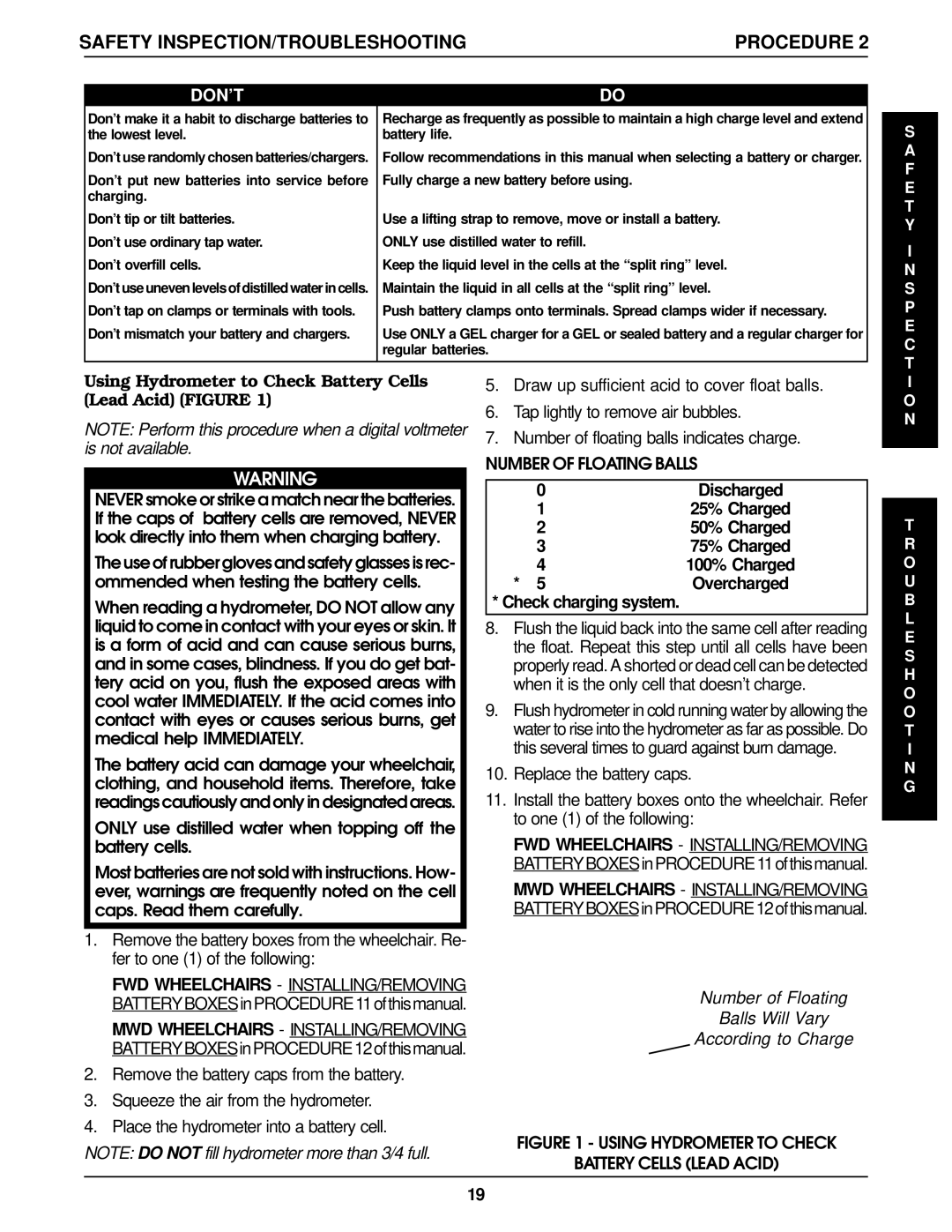
SAFETY INSPECTION/TROUBLESHOOTING | PROCEDURE 2 | ||
|
|
|
|
| DON’T | DO |
|
| Don’t make it a habit to discharge batteries to | Recharge as frequently as possible to maintain a high charge level and extend | |
| the lowest level. | battery life. |
|
| Don’t use randomly chosen batteries/chargers. | Follow recommendations in this manual when selecting a battery or charger. | |
| Don’t put new batteries into service before | Fully charge a new battery before using. |
|
| charging. |
|
|
| Don’t tip or tilt batteries. | Use a lifting strap to remove, move or install a battery. |
|
| Don’t use ordinary tap water. | ONLY use distilled water to refill. |
|
| Don’t overfill cells. | Keep the liquid level in the cells at the “split ring” level. |
|
| Don’t use uneven levels of distilled water in cells. | Maintain the liquid in all cells at the “split ring” level. |
|
| Don’t tap on clamps or terminals with tools. | Push battery clamps onto terminals. Spread clamps wider if necessary. | |
| Don’t mismatch your battery and chargers. | Use ONLY a GEL charger for a GEL or sealed battery and a regular charger for | |
|
| regular batteries. |
|
|
|
|
|
S A F E T Y
I
N S P E C T
Using Hydrometer to Check Battery Cells (Lead Acid) (FIGURE 1)
NOTE: Perform this procedure when a digital voltmeter is not available.
WARNING
NEVER smoke or strike a match near the batteries. If the caps of battery cells are removed, NEVER look directly into them when charging battery.
The use of rubber gloves and safety glasses is rec- ommended when testing the battery cells.
When reading a hydrometer, DO NOT allow any liquid to come in contact with your eyes or skin. It is a form of acid and can cause serious burns, and in some cases, blindness. If you do get bat- tery acid on you, flush the exposed areas with cool water IMMEDIATELY. If the acid comes into contact with eyes or causes serious burns, get medical help IMMEDIATELY.
The battery acid can damage your wheelchair, clothing, and household items. Therefore, take readingscautiouslyandonlyindesignatedareas.
ONLY use distilled water when topping off the battery cells.
Most batteries are not sold with instructions. How- ever, warnings are frequently noted on the cell caps. Read them carefully.
1.Remove the battery boxes from the wheelchair. Re- fer to one (1) of the following:
FWD WHEELCHAIRS - INSTALLING/REMOVING BATTERYBOXESinPROCEDURE11ofthismanual.
MWD WHEELCHAIRS - INSTALLING/REMOVING BATTERYBOXESinPROCEDURE12ofthismanual.
2.Remove the battery caps from the battery.
3.Squeeze the air from the hydrometer.
4.Place the hydrometer into a battery cell.
NOTE: DO NOT fill hydrometer more than 3/4 full.
5.Draw up sufficient acid to cover float balls.
6.Tap lightly to remove air bubbles.
7.Number of floating balls indicates charge.
NUMBER OF FLOATING BALLS
0 | Discharged |
1 | 25% Charged |
2 | 50% Charged |
3 | 75% Charged |
4 | 100% Charged |
* 5 | Overcharged |
* Check charging system.
8.Flush the liquid back into the same cell after reading the float. Repeat this step until all cells have been properly read. A shorted or dead cell can be detected when it is the only cell that doesn’t charge.
9.Flush hydrometer in cold running water by allowing the water to rise into the hydrometer as far as possible. Do this several times to guard against burn damage.
10.Replace the battery caps.
11.Install the battery boxes onto the wheelchair. Refer to one (1) of the following:
FWD WHEELCHAIRS - INSTALLING/REMOVING BATTERYBOXESinPROCEDURE11ofthismanual.
MWD WHEELCHAIRS - INSTALLING/REMOVING BATTERYBOXESinPROCEDURE12ofthismanual.
Number of Floating
Balls Will Vary
According to Charge
FIGURE 1 - USING HYDROMETER TO CHECK
BATTERY CELLS (LEAD ACID)
I
O N
T R O U B L E S H O O T I N G
19
